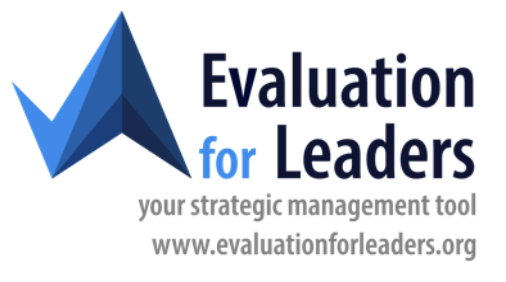Hello! We’re Chris Lovato, Professor in the School of Population & Public Health at the University of British Columbia, and Kylie Hutchinson, independent evaluation consultant with Community Solutions Planning & Evaluation.
Are you an internal evaluator looking to get more evaluation buy-in from senior leaders? Or do you have a manager you’d like to better educate about evaluation?

We have recently updated our free Evaluation for Leaders mobile course with more interactivity, more content on equitable approaches to evaluation, and more just-in-time resources! The purpose of this course is not to to teach leaders to do evaluation, but rather how they can include evaluation in their day-to-day decision making. After senior leaders and managers do this course, they will be able to better tell you how you can better help them.
Rad Resource:
Senior leaders do not actually design or conduct evaluations themselves, but they do play a role in ensuring that equitable approaches are used. By asking these questions of themselves and their evaluator(s), before and during an evaluation, they can ensure the evaluations they manage are appropriately equity-focused.
Hot Tip:
Leaders need to know that equitable evaluation can be more expensive than traditional evaluation, and they need to resource it properly. For example, additional costs may include:
- additional evaluator time to build trust and manage relationships, particularly with Indigenous communities
- need for more physical face-to-face time in certain communities, necessitating travel
- wages or honoraria to adequately compensate people for their time, plus added supports to ensure they can fully participate, e.g., transportation, day care, etc.
- training of participants and community members to collect data
- more lengthy types of data collection that build greater trust and engagement, e.g., interviews
- need for larger sample sizes if the data is to be disaggregated to learn what works for whom.
Check out Unit 3 in Evaluation for Leaders for other trade-offs they need to be aware of when an equitable approach is used.
Rad Resource:
These checklists on supporting evaluators have helpful tips for leaders on how to maximize both the internal and external evaluators they work with.
The American Evaluation Association is hosting Internal Evaluation (IE) Topical Interest Group Week. The contributions all this week to AEA365 come from our IE TIG members. Do you have questions, concerns, kudos, or content to extend this AEA365 contribution? Please add them in the comments section for this post on the AEA365 webpage so that we may enrich our community of practice. Would you like to submit an AEA365 Tip? Please send a note of interest to AEA365@eval.org. AEA365 is sponsored by the American Evaluation Association and provides a Tip-a-Day by and for evaluators. The views and opinions expressed on the AEA365 blog are solely those of the original authors and other contributors. These views and opinions do not necessarily represent those of the American Evaluation Association, and/or any/all contributors to this site.
